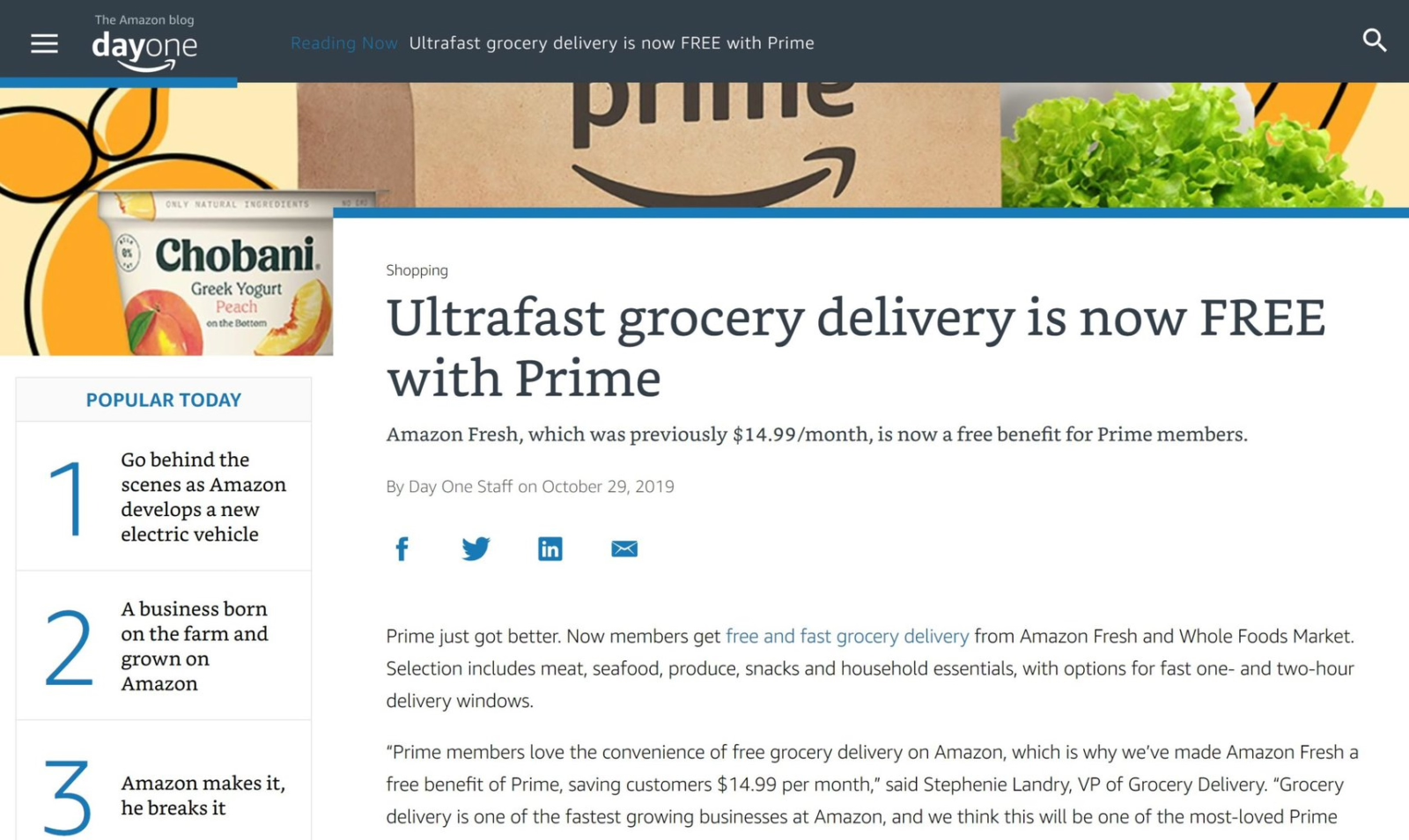Do you have an online shop or do you like shopping online? And you still want to act sustainably? It’s not that easy. We list the most important tips on how online shopping and climate protection can be better reconciled.
Amazon boss Jeff Bezos donates billions for the climate. This topic has dominated the headlines in recent days. The following news received far less attention last year: In the USA, Amazon Prime has recently started delivering items priced under one dollar – without shipping costs. One wonders whether this makes the billion-dollar donation more than obsolete. Sustainable selling looks different.
This is because every single order consumes resources: from logistics and packaging to transport. Not to mention the returns that accumulate in online shops – in some environments up to 30 per cent and more. So we consumers are also faced with a dilemma: walking or sympathising with Fridays for Future while at the same time shopping online or streaming every series on Netflix & Co. That’s not really compatible.

Companies like Amazon say they are working on offsetting their enormous CO2 consumption. But is it really possible to deliver every single bottle of shampoo ordered in a climate-neutral way by offsetting it? It will probably take quite a while until then – if at all possible. What can you do now? As a shop owner or as a consumer? An overview.
WooCommerce Hosting
With WooCommerce hosting, you can launch your own online store quickly and securely and manage it professionally – without any technical hurdles. Check our Raidboxes WooCommerce Hosting now.
“Green” online shops – how does that work?
More and more online shops are declaring themselves to be as sustainable as possible. This is a good way for smaller shops in particular to stand out from the crowd. And to be able to compete against Amazon, Zalando etc. You are doing something good and at the same time increasing your sales in the niche.
The following levers are available for online shops to work for the environment and the climate rather than against it – at least in part:
- Sustainable products: The best argument is, of course, if you sell goods that are already ecological in themselves. Or support sustainability – for example in the area of upcycling and second-hand. Nevertheless, you should also pay attention to the following points.
- Offsetting CO2 emissions: Even big names like Zalando now offer an optional additional fee per order to offset the CO2 emissions generated. It is currently 25 cents there. However, you should explain to your customers exactly how the amount is calculated and what it is used for.
- Green shipping: Service providers such as DHL GoGreen offer sustainable shipping solutions for an additional fee. Check your service providers’ offers very carefully here. If they are criticised, this will rub off on your company.
- Shipping costs: Charge shipping costs that correspond to the actual resources required. A minimum order value (caution: legal requirements) or free shipping costs only from a higher order total are further mechanisms to ensure that your customers make their purchases from you as collectively as possible.
- Packaging material: Pay attention to green raw materials and supply chains, not just for the products themselves. A giant cardboard box with a huge amount of plastic filling material for a manageable product? The big shops can annoy their customers with this. Please don’t do the same.
- Sensible handling of returns: Even politicians are now trying to prevent returns from being wasted. Find a sensible use for returns, sell them as B-goods in the shop or donate them to a good cause. Clarify in advance what is legally possible.
- Supply chains: Select your suppliers, subcontractors, labels, partners and brands according to their environmental credentials. You can also advertise this, for example by reporting on the shop in your blog or magazine. Open communication is good for your online shop.
Creative approaches are also required. For example, you could reward regular customers with a bonus system if they shop with you less frequently but more frequently. Or you could offer the option of adding items to the shopping basket one day after the order has been placed. Or until the final dispatch. Because users often forget part of the order.
No greenwashing please
The more of the aforementioned levers apply to your shop, the better. Be careful with methods such as CO2 offsetting or green shipping that you are not accused of pure greenwashing. Never claim something that you cannot fulfil. Sustainability thrives on transparency and authenticity. Fortunately, anything else will not work in the long term.
Tip: You should publicise your sustainable actions. For example, on a “Our mission” page. Or regularly in your blog. Such pages and topics are among the most clicked on of every portal. If they are personalised, the image boost will measurably increase sales.
Your green shop is particularly credible if you are also mindful behind the scenes. Just like we do at Raidboxes. In addition to compensating for our GreenHosting, we are gradually implementing a corporate philosophy that focuses on sustainability in all areas. This includes the following points, among others:
- Goals that do not focus on maximising profits, but on the benefits for our customers and society. See our vision on open source and equal opportunities.
- Environmentally conscious products and materials for our office, sustainable food for our employees.
- Employee participation programmes and the concept of holacracy. Support for home office and remote work.
- Fundraising campaigns organised by the team, for example for disadvantaged families.
- Internal workshops, for example on non-violent communication (NVC ).
We are constantly working to fulfil our social responsibility. And hope that the models mentioned will find many imitators. Do you want to establish a similar corporate culture and have any questions? Feel free to ask them in the comments. Or contact us at any time.

Opportunities for consumers
As a consumer, you have a lot of power. We rarely realise this. For example, you can support local shops wherever possible. Order books and similar goods from the bookshop around the corner, if there is still one in your town. This strengthens the local economy, supports small retailers and jobs and saves resources in shipping. At the same time, your mindful actions ensure that communities and city centres do not become even more deserted.
If you go to the city centres, strengthen small labels and boutiques. Ideally those that consciously select their suppliers according to transparent criteria. Do you only get your favourite products online? Or you don’t want to get in your car every time? You also have a choice online:
- Order directly from the online shop: And not from its marketplace account on Amazon or similar marketplaces. This often only costs a few seconds of research on Google. The shop operators will hopefully put the commission they lose to good use. You are also doing something for the shop that the shop owners run alongside the online shop.
- Things you don’t need immediately: Make a note of them on lists. Then you can have them sent all at once. Or order larger quantities for your stocks.
- Sustainable aspects: When shopping online, consider all the points I mentioned above for retailers. So green shipping, CO2 compensation, shipping costs, packaging materials, etc.
- Renouncing CO2 guzzlers: It’s not just SUVs that symbolise climate sins. It’s better to buy goods that need to be refrigerated all the time from your local supermarket.
- Eco label: What verifiable sustainability criteria does a product fulfil? And to what extent are they monitored? Be careful with labels and information about which little can be found out. Or which the retailer has even created themselves.
Also pay attention to transparency. The more a manufacturer reveals about its products, the better. Which ingredients are included? Where do they come from? How is the supply chain organised? Who in the company checks compliance with the criteria and how often? Shops like the avocadostore regularly report on how they are in close dialogue with their suppliers:

Incidentally, shop owners are required to provide numerous details on ingredients, etc. are mandatory. Otherwise you could face a warning. You can find out more about this in our article Making WooCommerce legally compliant.
WordPress and sustainability
Can there be a sustainable internet? And how “green” are WordPress and WooCommerce? Our article on WordPress and sustainability looks at what developers and users can do in detail. Do you run an online shop yourself? Then encourage your service providers and freelancers to realise that every line of source code saved makes a major contribution to environmental protection.
Danny van Kooten – the developer behind Mailchimp for WordPress – provides a drastic example:
Just last week I reduced global emissions by an estimated 59,000 kg CO2 per month by removing a 20 kB JavaScript dependency in Mailchimp for WordPress. There’s no way I can have that kind of effect in other areas of my life.
As few plugins as possible for WordPress & WooCommerce, reducing HTML, CSS and JavaScript, optimised image formats such as WebP, server-side caching – there are countless ways to save traffic on the web. In order to conserve energy resources.
Use green WordPress hosting
“If the internet were a country, it would have the sixth largest electricity consumption on our planet” – as described in a documentary by ZDF. At Raidboxes, we have our very own way of ensuring that online shops with WordPress and WooCommerce run as environmentally friendly as possible. Green hosting has been a matter close to our hearts from the very beginning. It’s not for nothing that we are the first climate-friendly WordPress host in the German-speaking world, and probably even worldwide.
Tip: Are you developing WordPress or WooCommerce sites for customers? Then host green and free of charge – with our FREE-DEV programme. You’ll also receive up to €1,500 commission per new customer.
For every WordPress site you host with us, we plant a tree for you. In 2019 alone, we were able to donate almost 30,000 trees thanks to our customers.
Managed WordPress Hosting
With our Managed WordPress hosting, you get a powerful, secure and easy-to-manage solution that quickly and reliably takes your WordPress project to the next level. Check it out!
We researched for a long time to find a partner that provides CO2 compensation with added value. We are working with Eden Reforestation Projects (Eden for short). This non-profit organisation works in regions that are particularly affected by climate change and global deforestation.

In its projects, Eden relies on local residents and workers who are paid from the donations. The organisation thus makes an active contribution to the fight against poverty. Do you want to do good and move to a sustainable web host that specialises in WordPress? Are you worried about whether the move from WordPress will go smoothly? Our support team will help you.
Your questions about sustainable online stores
Do you have any questions on this topic? Feel free to use the comment function. For more insights on WordPress, web design or online business, follow Raidboxes on Facebook or LinkedIn – or subscribe to our newsletter.
Featured image: Lacey Williams

Leave a Reply